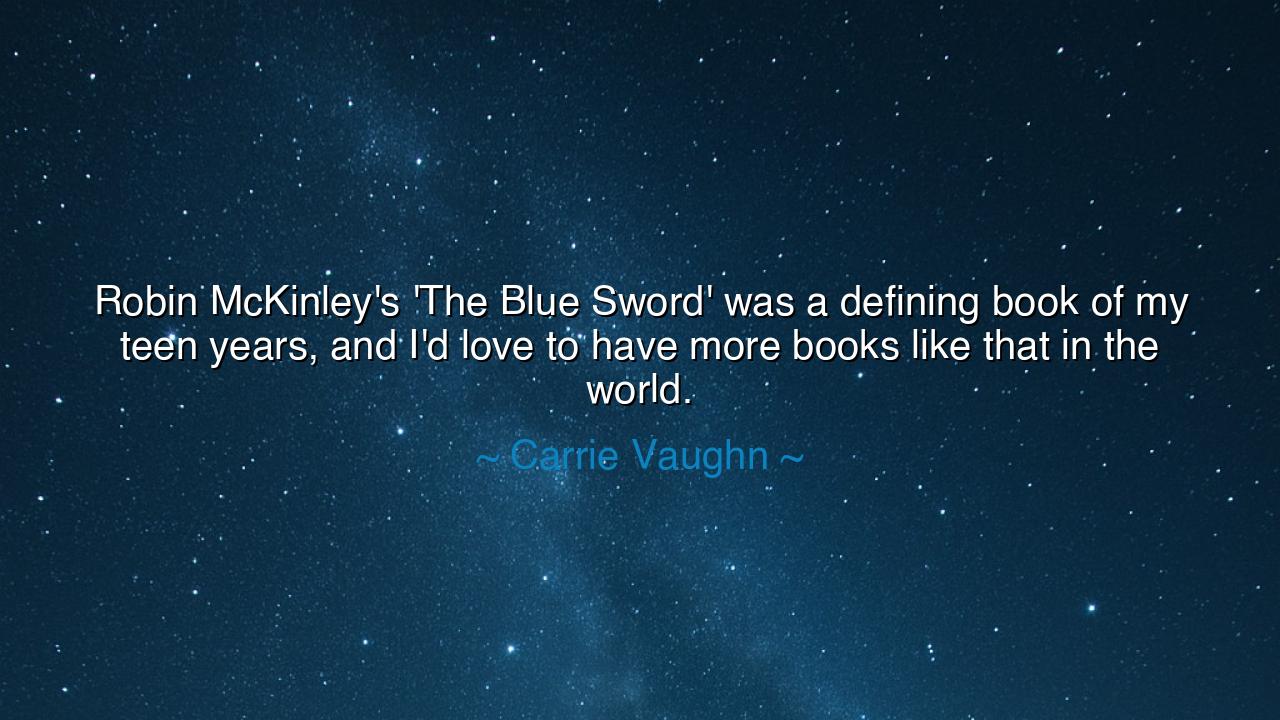
Robin McKinley's 'The Blue Sword' was a defining book of my teen
Robin McKinley's 'The Blue Sword' was a defining book of my teen years, and I'd love to have more books like that in the world.






Hear, O children of imagination, the words of Carrie Vaughn, who declared with reverence: “Robin McKinley’s ‘The Blue Sword’ was a defining book of my teen years, and I’d love to have more books like that in the world.” What seems a mere remembrance of a story beloved is in truth a hymn to the power of books, and to the way a single tale can carve rivers into the soul of the young, guiding their thoughts, their dreams, their very destinies. For the right book, encountered at the right time, becomes not merely a pastime but a companion, a mentor, a torch that lights the dark path of youth.
The novel she names, ‘The Blue Sword’, was no ordinary tale. Written by Robin McKinley, it wove together threads of fantasy, courage, and self-discovery. To a young reader, it was more than ink on paper; it was a world alive, a land where one could stand beside a heroine who rose from obscurity to greatness. For Vaughn, and for many like her, this was not just entertainment—it was initiation. It whispered: “You too may carry the sword. You too may become strong, even when the world does not yet see your strength.” This is why she calls it defining: it etched into her spirit the truth that courage can belong to anyone.
In this confession lies a profound truth about the teen years. They are the years of searching, of longing for a mirror that reflects the greatness hidden within. The right book, the right story, arrives like a prophecy, showing the youth what they could become. Just as Alexander, when young, read of Achilles and vowed to match his deeds, so too did Carrie Vaughn read of McKinley’s heroine and recognize in her a spark of her own destiny. Out of that spark, Vaughn herself became a teller of tales, shaping stories that would inspire others in their turn.
Consider the story of Malala Yousafzai. As a young girl, she read of women who fought for justice, of leaders who refused silence, and in their stories she found courage to stand against oppression. Books were her weapons before the world ever knew her name. What she read gave her vision, and what she envisioned gave her power. Vaughn’s love of ‘The Blue Sword’ speaks of this same timeless principle: that stories plant seeds, and the harvest is courage, conviction, and creation.
The origin of her quote is thus not in mere nostalgia but in a recognition of how vital such stories are. Vaughn longs for more books like McKinley’s, because she knows that each generation of youth hungers for tales that will shape them as hers did. Stories of wonder, bravery, and transformation are not luxuries—they are necessities, the food of the spirit. Without them, the young may stumble without vision; with them, they rise with fire in their eyes.
What lesson, then, shall we take from these words? That we must treasure the stories that shaped us, and seek to pass forward their power. Parents, teachers, and elders must not dismiss the books of youth as “mere fantasy,” for they may contain more truth than volumes of philosophy. The young must not be ashamed of the books that define them, but hold them proudly, knowing that in those pages lie the blueprints of their strength.
Therefore, let us act. Read deeply, and share the books that moved you with those who come after. Support the writers who dare to create worlds of wonder, for they are forging swords for the hands of the young. And if you feel within yourself the fire to write, do not withhold it—perhaps your words will become, for another soul, what ‘The Blue Sword’ was for Carrie Vaughn: a defining light in the restless night of the teen years, a beacon that points the way to courage and destiny.






AAdministratorAdministrator
Welcome, honored guests. Please leave a comment, we will respond soon